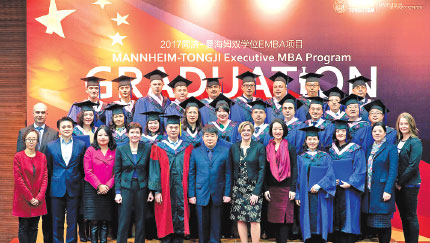Sino-German EMBA program brings trade partners closer
In a business world with fierce competition and increasingly diverse market demand, international business education provides senior management a channel to receive the best tools for addressing an array of issues.
Business education in China has developed quickly in recent decades, and a large number of MBA programs, both part-time and full-time, are now available. Among them, the Mannheim-Tongji Executive MBA program has firmly established itself as one of the country's elite business programs and its performance has been recognized by rankings all over the world.
The first and only Sino-German EMBA program in China, the Mannheim-Tongji Executive MBA program is the result of the partnership between the German Mannheim Business School and the Tongji University School of Economics and Management in Shanghai. It is aimed to help experienced professionals and executives sharpen their skills for a top management career at the interface of the two economic powerhouses, and has become a Sino-German showcase project.
It was established seven years ago, when economic relations between China and Germany began to intensify. With a strong Sino-German focus, the program was implemented in response to the growing demand of managers to navigate business challenges across cultures.

Both universities are renowned for their high academic quality, cutting-edge research and teaching standards. Tongji SEM is known for its academic excellence, and is among the most prestigious institutions in the world by receiving accreditation from many world leading business education networks.
Mannheim Business School is the leading institution for management education in the German-speaking region. According to the Financial Times Global MBA Ranking 2017, MBS ranked 54th among the 100 best business schools.
The two schools have substantial experience in executive education, with excellent corporate and alumni networks.
Through the two schools' collaboration, the Mannheim-Tongji dual degree Executive MBA program provides participants with the very best in EMBA education, said Huo Jiazhen, former dean of Tongji SEM.
"Combining the two institutions' strengths and advantage resources, the Mannheim-Tongji EMBA program provides senior executives from around the world with the knowledge, skills and tools necessary to succeed in high positions of international management," Huo said.
"We are all aware of the significance and dynamism of Sino-German trade relations. As the economic partnership between the two countries has grown, the need for management education programs that focus on Sino-German relations and build a bridge for cooperation among the business elite is more than apparent," said Bettina Kosiel, director of the EMBA program at Mannheim Business School.
The design of the Mannheim-Tong ji EMBA program has unique advantages, said executives for the program. It has included broad general management expertise from the business domains of strategy, marketing, finance, operations, innovation and people skills with Sino-Germany perspectives, as well as best practices from all over the globe.
It aims to provide participants with the necessary knowledge, skills and tools to be a more effective leader in the vibrant business cultures of China and Germany.
The international environment with the multicultural perspectives, experience and expertise of a heterogeneous student body and alumni group are important parts of the program.
It has six study modules with equal numbers of Chinese and foreign participants to be taught at both Tongji University in China and Mannheim Business School in Germany.
According to the 2017 Global EMBA Rankings by Quacquarelli Symonds, a British organization specializing in education and study abroad, the Mannheim-Tongji EMBA program takes 14th place in the list of the world's best EMBA programs. It is the first time for the program to participate in the ranking.
"While studying in the Mannheim-Tong ji EMBA program, I gained the necessary business knowledge and management skills to help me to progress quickly along my career path and made lifelong friends," said program participant Marc Poetzsch at the graduation ceremony held on March 12 in Shanghai.
During the 2017 graduation ceremony, a total of 33 participants received their dual degrees from the two schools after two years of study.
Economic and trade relations between Germany and China have grown closer over the years, and the Mannheim-Tongji EMBA program has played a positive role in fostering the connection between the two countries, Bettina Kosiel said at the ceremony.
She added that the two schools will continue to maintain close communication and interaction in the future and try to create more quality programs.
Flexibility and global expertise
The Mannheim-Tongji EMBA program has offered participants diversified and flexible study options to meet the needs of executives in the fast-paced business environment.
Such flexible concepts allow participants to better adapt their studies to their individual careers. Meanwhile, it enables participants to conveniently combine their studies with work and family life, an official for the program said.
The EMBA program, starting in May and September each year, consists of six modules that cover various management subjects, each consisting of four different skill courses taught by experienced faculty.
Some courses focus on broad general management expertise, integrating perspectives and best practices from all over the world, and others, such as "Cooperation in Multi-Cultural Teams" and "Negotiation in a Sino-German Context" work to shape participants into effective leaders in international business circles.
After finishing all the modules, participants start to work on their master thesis before receiving their degrees.
With such flexible courses offered, participants can complete the program based on their own circumstances, usually within one and a half years to three and a half years.
Wang Hongyi
wanghongyi@chinadaily.com.cn
|
Participants celebrate their graduation from the Mannheim-Tongji EMBA program in March 2017. Photos Provided To China Daily |
|
Participants of the Mannheim-Tongji EMBA program have a discussion in class. |
(China Daily 03/24/2017 page16)














